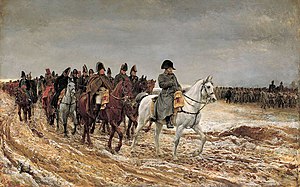Campaign in north-east France (1814)
| 1814 campaign in northern France | |||||||
|---|---|---|---|---|---|---|---|
| Part of the War of the Sixth Coalition | |||||||
 1814 campaign in France by Meissonier | |||||||
| |||||||
| Commanders and leaders | |||||||
|
|
| ||||||
| Strength | |||||||
| More than 1 million | Between 150,000 and 360,000 | ||||||
| Casualties and losses | |||||||
| At least 100,000 casualties | At least 65,000 casualties | ||||||
The 1814 campaign in northern France involved Coalition armies closing in on Napoleon after his defeat at the Battle of Leipzig in 1813. From January to late March 1814, Napoleon fought a series of battles against overwhelming odds. At the campaign's conclusion, the Coalition captured Paris and exiled Napoleon to Elba.
The Coalition crossed the Rhine with a three-pronged force totalling 350,000 men, aiming to converge on Paris:
- The Army of Bohemia or Grand Army, with 210,000 Austrians under the Austrian Schwarzenberg, passed through Swiss territory and crossed the Rhine between Basel and Schafhausen on the 20th of December 1813.[1]
- The Army of Silesia, with 75,000 Prussians and Russians under the Prussian Blücher, crossed the Rhine between Rastadt and Koblenz on 1 January 1814.[1]
- The Army of the North with Prussian and Russian corps under the command of Wintzingerode and Bülow "quickly followed":[1] Bernadotte with 60,000 from the Netherlands.
Napoleon attempted to counter the incursion of the Army of Silesia shortly after their crossing but arrived too late, meeting only the rearguard. Engaging in pursuit, he met the force at Brienne on 29 January 1814, inflicting 4000 casualties and taking 3000 of his own. Blücher and Schwarzenberg's forces combined three days later to attack Napoleon in the Battle of La-Rothière. Napoleon retreated and the Coalition continued their three-part advance towards Paris. On 10 February Napoleon won a victory in the Battle of Champaubert. He thus took a central position between divisions of the Army of Silesia, winning further victories in the battles of Montmirail and Vauchamps to complete his Six Days' Campaign.[2]
However, south of Paris the Grand Army had succeeded in advancing between Marshal Oudinot and Marshal Victor, forcing them to establish a defensive line just 18 miles (29 km) from Paris. Napoleon arrived to fight the Battle of Montereau on 18 February 1814. Blücher led another advance towards Paris on 24 February before being forced to withdraw on 2 March under pursuit by Napoleon. Napoleon tried to march towards Laon but was confronted by Blücher's forces in the Battle of Craonne, where he lost over 6000 men. On 9 March the Battle of Laon began; Napoleon's forces were severely outnumbered in this fight, and many of his marshals were defeated in conflicts elsewhere around Paris. Nevertheless, he gained a quick victory in a skirmish near Reims on 13/14 March and began pursuing Schwarzenberg's forces. Napoleon won a very narrow victory against the Grand Army in the Battle of Arcis-sur-Aube, but withdrew. A letter outlining his plan to move on the Marne was intercepted by the Coalition, which prepared to attack Paris in his absence.[2]
On 2 April, the Sénat passed the Acte de déchéance de l'Empereur ("Emperor's Demise Act"), which declared Napoleon deposed. Napoleon had advanced as far as Fontainebleau when he learned that Paris had surrendered. When Napoleon proposed the army march on the capital, his marshals decided to mutiny.[3] On 4 April, Napoleon abdicated in favour of his son, with Marie-Louise as regent. However, the Coalition refused to accept this. Napoleon was then forced to announce his unconditional abdication only two days later with the Treaty of Fontainebleau. Napoleon was sent into exile on the island of Elba, from which he would escape the following year, and Louis XVIII became king.
Notes
This article includes a list of general references, but it lacks sufficient corresponding inline citations. (February 2014) |
- ^ a b c Hodgson 1841, p. 504.
- ^ a b Traveling the French Campaign of 1814, University of Guelph
- ^ Gates 2003, p. 259.
References
- Gates, David (2003), The Napoleonic Wars, 1803–1815, Pimlico, ISBN 0-7126-0719-6
- Hodgson, William (1841), The life of Napoleon Bonaparte, once Emperor of the French, who died in exile, at St. Helena, after a captivity of six years' duration, London: Orlando Hodgson
- Lawford, James, Napoleon: The Last Campaigns, 1813–15
